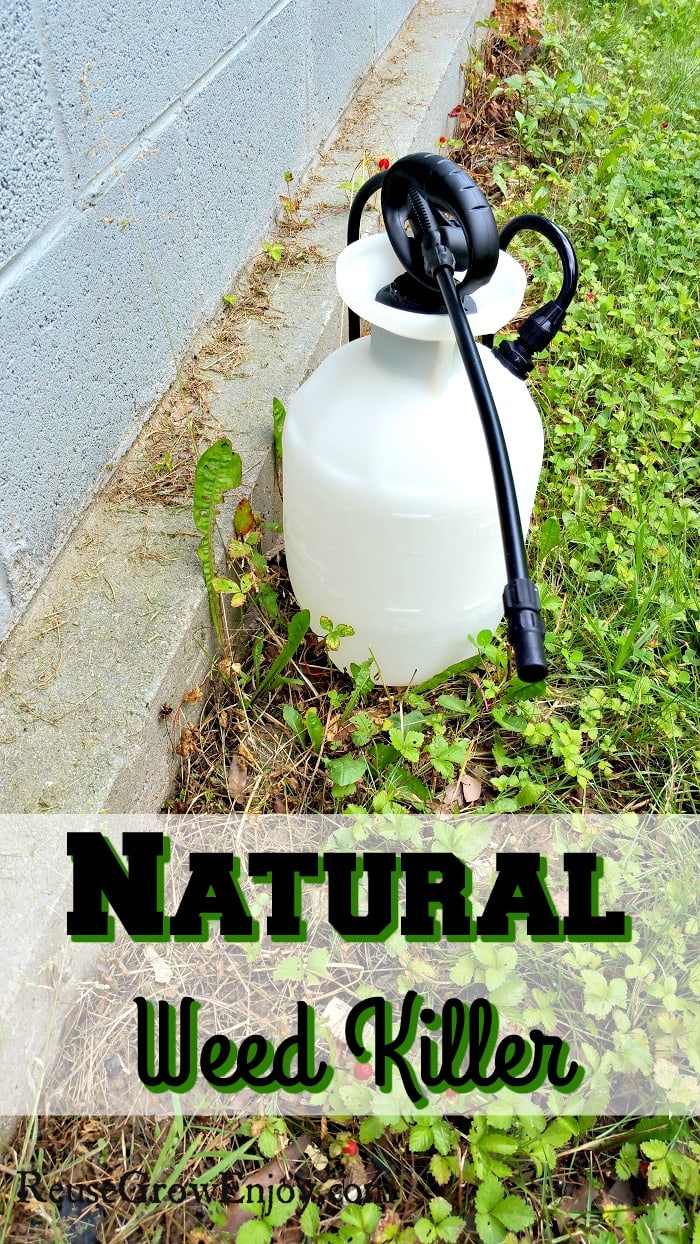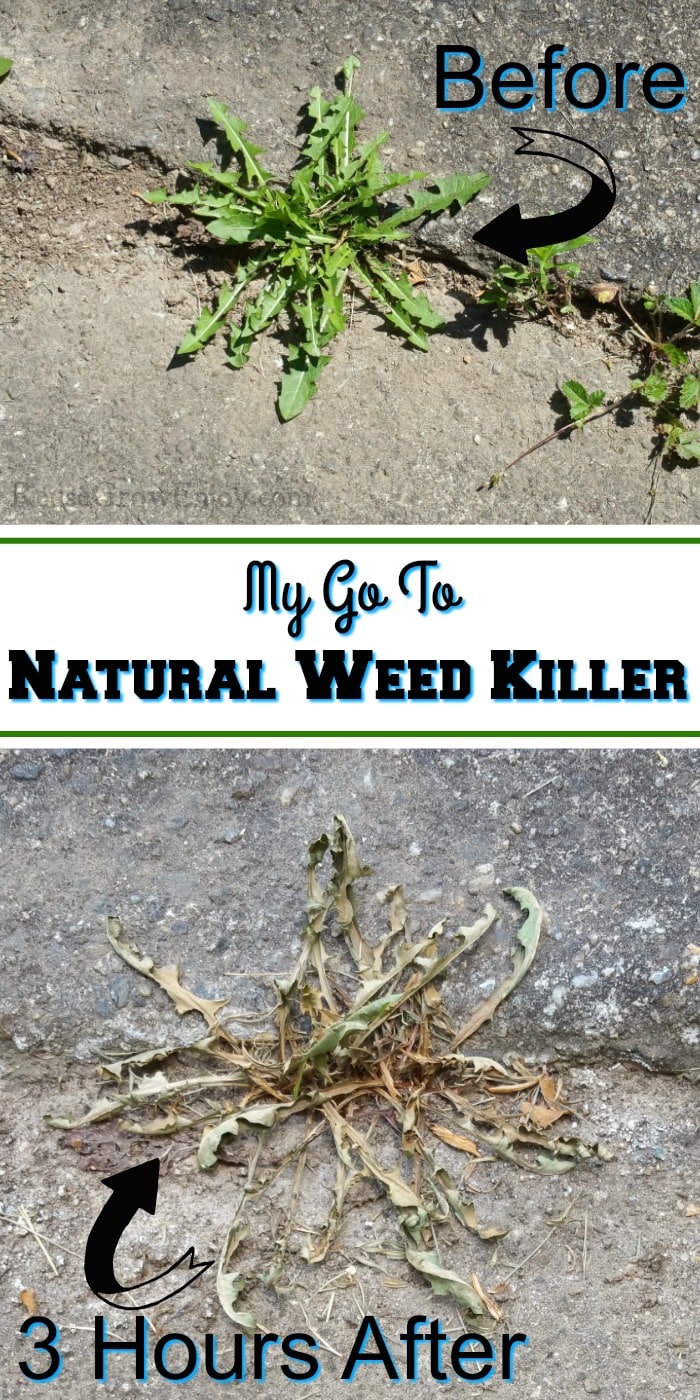Having trouble with weeds but don’t want to use harmful chemicals? Did you know there are things you can use as a natural weed killer? It is my go-to for weed killing!
Natural Weed Killer
Ever get sick of having to cut the weeds around the yard and house, now that it is hot out and they are growing better than ever?
If you are like me, spraying harsh chemicals around just to keep weeds down is out of the question! If that sounds like you too, I have good news! Did you know there are things you can use as a natural weed killer?
Not only by keeping the weeds in check makes your yard look nice and clean, but it also helps to keep the bugs, snakes, and ticks down too.
Most people try to look for any kind of chemical that will get rid of our unwanted weeds. Farm stores are loaded with them. Various sizes and strengths all formulated to kill off our weed problem.
The issue with that is, not only do you spray it on the weeds it could wash off and be on other plants you eat. Or it could get on you, your pets and kids when you are in the yard.
The answer to this is to use a natural weed killer, and chances are it is something you probably have in your kitchen right now. Vinegar!
Yes, household vinegar will kill off your pesky weeds within hours after spraying them. While either apple cider or white vinegar will work, I have found that the white vinegar is normally a cheaper natural weed killer.
How To Treat Weeds With Vinegar:
Your first step is to get a sprayer. If you are just doing a few little spots likes cracks in a sidewalk, a little hand sprayer like a spray bottle will work.
But if you are doing large areas, that can be rough on the back bending over that long. So I like and use one of the one-gallon hand sprayers.
They are usually around ten-fifteen bucks for a one-gallon small unit. It is a good idea to use the sprayer just for the natural weed killer. Because you do not want to mix dangerous chemicals and natural vinegar in your sprayer.
You can use a dilution of two parts vinegar to one part water. However, I prefer it straight, no water, just a jug filled with vinegar. Then you just go to your group of weeds and simply spray them with your solution.
Then wait. If it is a sunny day out, it will only take a few hours for the natural weed killer to start to work and you will see the green weeds turning brown.
Where You Can Use This Natural Weed Killer:
This won’t work well in or around your garden. Because it will kill your plants too if you are too close.
That is because unlike harsh chemicals that have been specially engineered to only kill weeds, this natural weed killer will just kill any greenery you spray it on.
Your best option for in the garden area is to just go about it old style with a garden hoe or weed puller tool. One of my favorite garden tools for this is the Hula-Ho.
However, there are plenty more areas in your yard that have weeds that are getting out of control, where this natural weed killer comes in handy.
On your deck outside, between the boards. The annoying weeds on the edge or between the lines of your sidewalk. How about the small bunches of grass that grow in the cracks of your paved driveway.
Or what about that chain link fence that has grass and vines growing up so fast you can’t keep it down fast enough even with a grass trimmer.
Small corners of your yard that you can’t get to with a mower. It will kill whatever you spray pretty fast and you can rest assured knowing that the residue it leaves behind won’t harm other living beings.
If you liked this post on natural weed killer, you may also want to check out some of these others.
- Apple Cider Vinegar Uses
- Strawberry Wash – Also Great For Other Produce
- How To Make Your Mower Last Longer!
- Top Gardening Tools You Must Have




Connie O. says
I would like to know about vinegar killing weeds. I have a raised garden which has not been used for a few years–lot of weeds now. If I use the vinegar solution to kill the weeds–would I be able to plant flowers in there in a few weeks?
Reuse Grow Enjoy says
Hi Connie, if use the vinegar, I would give the soil at least a month before trying to plant your plants back in the raised garden bed.
Pat G says
I am in total agreement with you about keeping things as natural as possible especially when harsh chemicals are killing the bees and beneficial insects! I’ve found that 30% vinegar is the best. I’ve added some orange oil to it which also not only helps to kill weeds but has a delightful fragrance!
Sean says
Thanks for the article, this is good info. One question I have is that you mentioned it can kill weeds but further down the article, you mentioned that you also use to kill path of grass. so then how do you kill the weeds in the yard without killing the grass around it with a 1 gallon spray?
Thanks, Sean
Reuse Grow Enjoy says
Sadly this will not work for killing weeds that are right next to grass/plants you want to keep.
Either way I am definitely trying this today. Cynthia says
Hello! Thank you for your information. If the vinegar kills the weeds as shown in your picture, does it kill the weeds all the way down to the root? Either way I am definitely trying this today.
Reuse Grow Enjoy says
Hi Cynthia, it really depends on the type of plant and if it is new growth or an old plant. If it is a new plant it can kill down to the root. However, if it is a plant that has been around awhile it may not get the root and you may have to reapply every month or so. Hope that helps!
William P. says
If I may comment, in addition to the vinegar, I add 1 cup of table salt and add 1/3 of a cheap (28 oz) bottle of dish soap. The salt complements the vinegar strength and the soap allows the mixture to stick to the leaves and roots of the weed. Shake every time you use it. If using a gallon sprayer, I always take out the plunger and spray off the residue from your weed killing. I do not leave the plunger in the sprayer between treatments for it will affect the life of the plunger.
If you are concerned with weed spraying in the grass and doing damage, adjust the spray to a stream and spray only the stem area of the weed.
Karen says
Can I use the salt for melting ice and snow instead of table salt or epsom salt??
Reuse Grow Enjoy says
I would not recommend it as it normally has other chemicals in the salt that is for sidewalks and driveways.